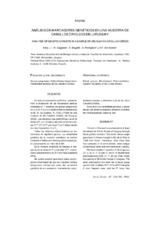Mostrar el registro sencillo del ítem
Análisis de marcadores genéticos en una muestra de caballos criollos del Uruguay
| dc.contributor.author | Gagliardi, R. | |
| dc.contributor.author | Postiglioni, A. | |
| dc.contributor.author | Andrés Cara, D.F. de | |
| dc.contributor.author | Biagetti, R. | |
| dc.contributor.author | Kelly, L. | |
| dc.date.accessioned | 2010-05-20T11:05:00Z | |
| dc.date.available | 2010-05-20T11:05:00Z | |
| dc.date.issued | 1998 | |
| dc.identifier.issn | 1885-4494 | |
| dc.identifier.uri | http://hdl.handle.net/10396/3389 | |
| dc.description.abstract | The aim of this work is to charaterize at least tentatively the Criollo Horses of Uruguay through blood genetic markers. This breed, whose origin goes back to horses brought to Rio de la Plata in 1538 from Spain, nowadays, after more than four centuries in its environment, owns unique zootechnical traits and well developed rusticity. We have studied 7 systems of blood groups (A, C, D, K, P, Q and U) and 6 of biochemical polymorphisms (A1B, Al, Tf, alk-Es, PGD, PGM) in a sample of 99 Criollo Horses of Uruguay. The most polymorphic loci were the D blood group system with 13 alleles, Ddelo, Dadl and Ddkl being the 3 most frequent ones, and the Tf locus, that displayed 7 alleles, D and F2 having the highest frequency. The genetic variability of the sample was estimated through the average heterozigosity that reached a value of 0.435. Concerning the origin of the breed, we have to stress the presence in our sample of TfJ and Dcfgk, breed allele markers of the Spanish Pure Breed Horse. We conclude from these results that the present days Criollo Horses of Uruguay have preserved some blood genetic traits of its ancestors that differentiate them from the other Criollo Horses, displaying at the same time an important amount of genetic variability as shown by the high value of average heterozigosity. | en |
| dc.description.abstract | En esta comunicación preliminar, presentamos la evaluación de las frecuencias alélicas obtenidas en 7 sistemas de grupos sanguíneos (A, C, D, K, P, Q y U) y 6 polimorfismos bioquímicos (A1B, Al, Es alcalina, Tf, PGD y PGM) en una muestra de 99 Caballos Criollos del Uruguay (CCU). Los sistemas más polimórficos fueron el sistema D, con 13 alelos siendo los más frecuentes: Ddelo, Dadl y Ddkl, y el locus Tf con 7 alelos siendo los más frecuentes: D y F2. Todos los sistemas electroforéticos se encontraron en equilibrio génico. La variabilidad genética de la muestra estudiada se estimó mediante el Índice de Heterocigosidad esperada, el cual presentó un valor de 0,435. En la muestra analizada se destaca la presencia de la variante TfJ y del alelo Dcfgk, marcadores característicos de la Pura Raza Española (PRE). Se puede concluir que estos datos proporcionan información de que los Caballos Criollos Uruguayos conservan parte del potencial genético de sus ancestros, manteniendo características propias y diferentes a la de las otros Caballos Criollos. En cuanto a la variabilidad genética, a pesar de ser una muestra pequeña, presentó un índice de heterocigosidad bastante alto. | es_ES |
| dc.format.mimetype | application/pdf | es_ES |
| dc.language.iso | spa | es_ES |
| dc.publisher | Universidad de Córdoba, Servicio de Publicaciones | es_ES |
| dc.rights | https://creativecommons.org/licenses/by-nc-nd/4.0/ | es_ES |
| dc.source | Archivos de zootecnia 47 (178-179), 259-266 (1998) | es_ES |
| dc.subject | Caballos | es_ES |
| dc.subject | Razas equinas | es_ES |
| dc.subject | Grupos sanguíneos | es_ES |
| dc.subject | Marcadores genéticos | es_ES |
| dc.title | Análisis de marcadores genéticos en una muestra de caballos criollos del Uruguay | es_ES |
| dc.title.alternative | Analysis of genetic markers in a sample of uruguayan criollo horses | en |
| dc.type | info:eu-repo/semantics/article | es_ES |
| dc.relation.publisherversion | http://www.uco.es/organiza/servicios/publica/az/az.htm | es_ES |
| dc.rights.accessRights | info:eu-repo/semantics/openAccess | es_ES |

